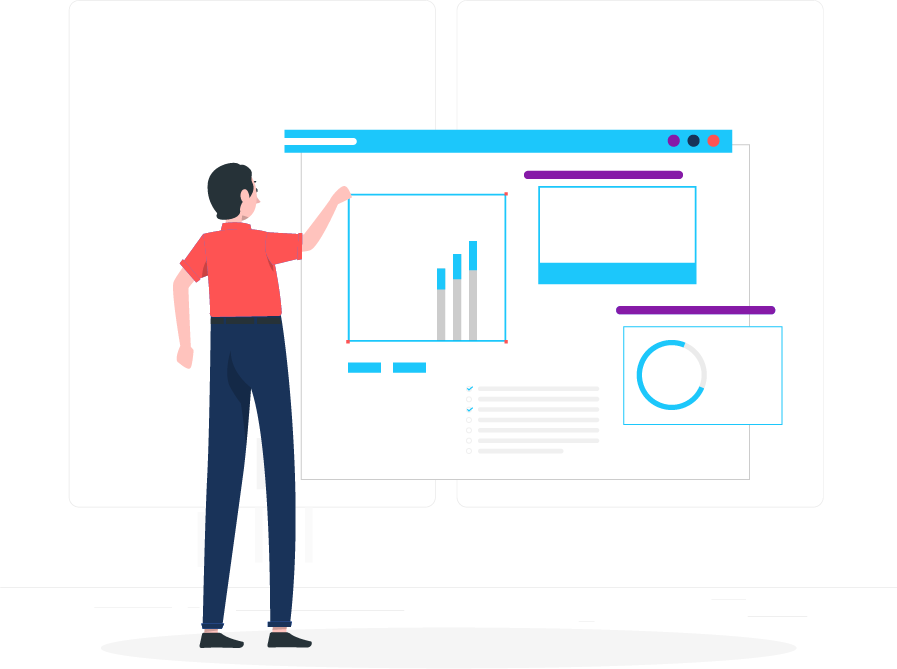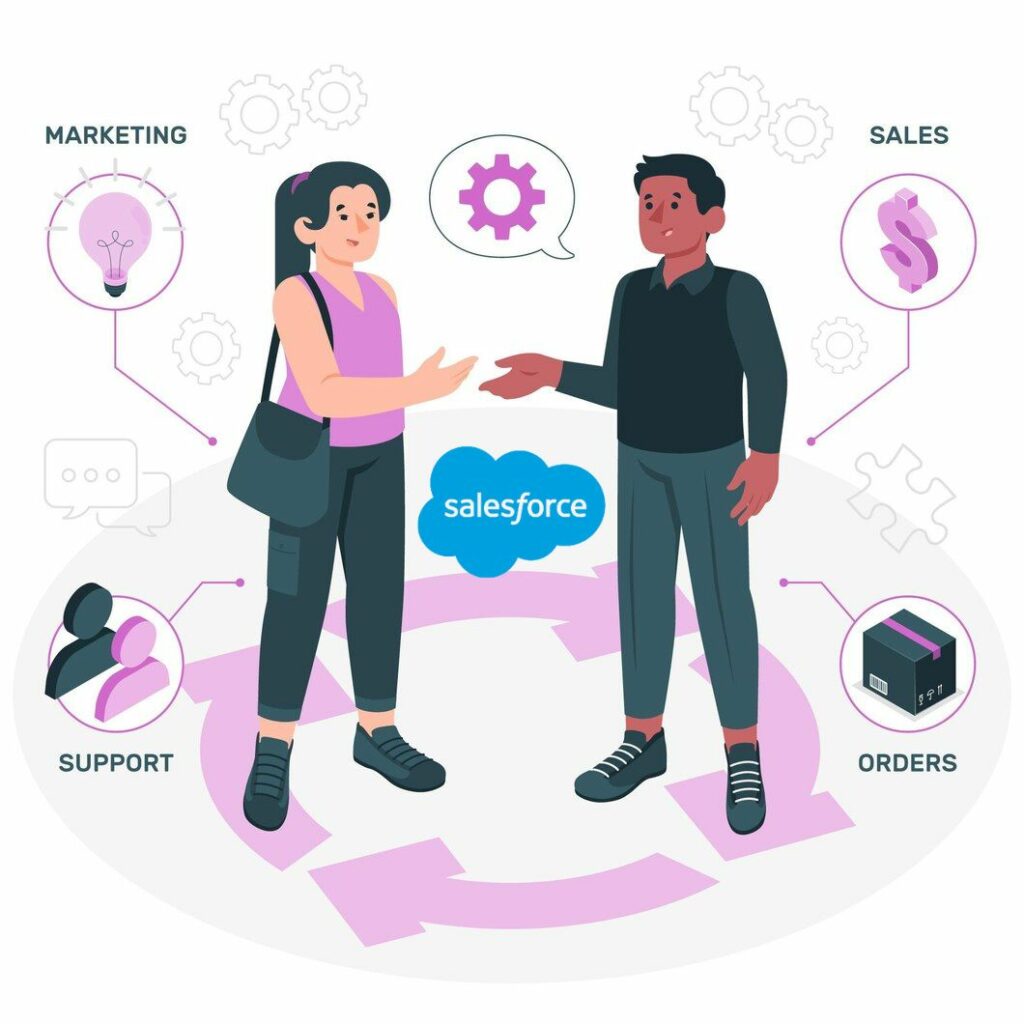Why is it necessary for companies to have an ERP system?
Why is it necessary for companies to have an ERP system?
Manufacturing Resource Planning (MRP) of the 1960s became Enterprise Resource Planning (ERP) in the 1990s.
MRP handled only inventories. At the same time, ERP handles finance, accounting, supply chain, marketing, inventory, and many other functions. As needs increase and new responsibilities come up, technologies keep on improving.
Let’s understand more about ERP and its significance for enterprise growth.
What is ERP?
Many definitions exist for ERP, but all mean the same. ERP is the solution for your need to manage all business functions using one system.
ERP is a business management software to manage all your business activities, processes, and operations. It is a comprehensive solution that integrates several business applications into one system. It automates your business processes, creating seamless workflows.
It records all your business functions, information, and data, stores them, and offers you the relevant output when needed. You can use them to analyze your business performance, understand what is going on in various business departments, and make informed future decisions.
All these sound-like big things are happening in large corporations with complex business processes. But that is not the case. Big corporations, medium-sized enterprises, and start-ups use ERP to improve their operations. Let’s see why every business needs ERP.
Why do enterprises need ERP?
Businesses operating in different sectors, of different sizes, and with different models need ERP for the following reasons:
Automation
An organization not using ERP struggles with daily, standardized workflows. Tracking timesheets, checking the flow of orders, monitoring inventory levels, etc., take up most of your time. Employees spend their time and effort on monotonous tasks, lowering their morale. Also, the chances of human error are high, making your data and decisions unreliable.
On the contrary, the ERP system integrates your business processes. It automates all your functions – marketing, accounting, inventory, supply chain, finance, and all other business operations. Automated processes reduce the chances of error and finish your work in lesser time, ensuring the consistency and accuracy of the data across different departments of the business. Time saved is money saved.
Since ERP automates your processes, it saves you from time-taking, monotonous, and tedious tasks. Your ERP system can manage the data entry, calculations, and monitoring tasks well. Thus, your employees’ morale stays high, and you enjoy higher productivity and operational efficiency.
Also, with time saved, your employees can focus more on the core processes and not on the mundane, routine operations. It improves your decision-making, boosts business performance, and makes you more competitive.
Customer segmentation
The pre-ERP period witnessed organizations asking different departments to collect data for specific processes. At a time, you could view only inventory, sales, marketing campaigns, customer details, etc., in silos. You never had consolidated data from all functions to see the correlation between departments and the impact of your resources.
With ERP systems, visibility around the overall business performance becomes clearer and smarter.
You have all your customer records, vendor details, production, transactions, and payment information in the centralized database. You can view this data stand-alone or in association with other processes or functions.
For any business function, all this information is available in real time. If changes occur in one data set, an automatic update of the related records across the departments occurs. Such a complete picture helps teams make decisions to improve operational productivity.
For example, you collect all information about customer A, including:
- Demographics
- Order history in one year
- Product prices
- Offers and discounts
- The total purchase amount in that year
- Payment method used
- The marketing method through which you attracted the customer
All these details give you an idea of the following:
- Effectiveness of your campaign to attract A
- Revenues generated from A
- Money spent on A
Thus, with an ERP system, you can identify connections between processes. You can decode the data into details by drilling it down to the minor level of information. The drilling down and data associations make your understanding of operations better.
Collaboration
With the old technology systems, different departments created their function-related records and stored the data with them. They also analyzed the data and presented insights or made decisions. But it wasn’t easy to combine the data from different functions and make collaborative decisions.
ERP addresses this difference. The ERP software integrates various business processes. Such integration facilitates sharing of data and information between business functions. And this sharing enhances collaboration between and within teams.
Since collaboration becomes a part of the process, focusing on the core jobs becomes easier for teams. It is already available on the ERP system whenever they need data from other teams. Thus, they can use any data to generate insights into the operations and desired results.
Another factor is that everyone can access the same single truth in the shared database. So, the chances of errors in further processing are less because they are working with correct data. Thus, errors reduce, data is complete, and projects keep running without hiccups. Hence, operations are productive and successful.
Control
Systems, functions, and departments worked in fragments in the pre-ERP period. So, it was challenging to have control over processes and workflows.
ERP software has brought more control to organizations.
Now, senior management is aware of what is going on. They have a centralized database to check the status of any and every function. The teams are working in collaboration to bring positive transformation to the operations. Data flows seamlessly across processes without fear of errors, inconsistencies, or security.
You can generate various insightful reports from the ERP system. You do not need to invest in research, compilation, or a separate business intelligence tool; analytics is available in ERP. You also have customizable dashboards on ERP systems to generate custom reports and make quick, better decisions.
All the functions have the same insightful reports to look at and make decisions. The base of information is the same; hence, the information shared with the world is coherent. With standardized reporting and integrated working of the business functions, management becomes easier. Thus, you have more control over the data, resources, and operations.

Agility
We have all heard the sayings about ‘change’ – Change is inevitable.
Even the business climate changes every day. How you respond to the change makes you solid and sustainable in the long run.
ERP systems are flexible, and thus, they respond to change effectively. As customers’ needs change and market dynamics shift regularly, your ERP systems’ scalability requires improvement.
When you implement ERP, you can initially select specific applications to add. As your business needs upgradation, you can add more modules to improve your functionalities. These new applications help you with more complex operations, more work, and more insights.
Another way of looking at improved business agility is the automation of processes by ERP systems. Since processes get automated, you can complete them faster and more accurately. Thus, your business agility increases, helping you make faster and more informed decisions.
Planning
For future planning, you need historical data, insights and analytics, and the current status of operations. The ERP system provides access to all these. Thus, you can easily plan your finances, inventory management, resources, production, etc.
ERP system helps you monitor your processes – inventory, production, vendor supplies, and demand.
- You can track your inventory at every stage of the supply chain – at warehouses, in transit, or store shelves.
- You can record customers’ past orders, preferred products and services, and changes.
- You also have scheduling about your production cycles, ordering raw materials, and resources engaged in production processes.
Based on these, you can plan your operations in total. With insights into all inter-related processes, you can plan your activities to ensure maximum use of the capacity and capability. It leads to better reporting, accurate business decisions, reduced downtime, and cost optimization.
Furthermore, ERP systems have integrated forecasting tools to generate accurate forecasts. You can predict events, such as demand, finances, resources, and timelines. Thus, your errors reduce, risks are better managed, and the accuracy and reliability of your operations improve.
Security and Compliance
When you have 1000s of customer records and transaction details, data security scares you. You fear the risks of fraud, cyberattacks, and non-compliance with regulations. But a robust ERP system relieves you because it secures your data, manages risks, and complies with regulations.
ERP software has the required security protocols and certifications to keep your data safe and secure. With such advanced security measures, you are safe from cyberattacks or fraud.
Furthermore, you have more visibility and control of your data. Your business has well-defined and automated workflows. Thus, the chances of fraud and risks of business disruption reduce.
ERP systems track all your transactions, operations, and activities in any business function. The reports integrated into ERP systems are compliant, helping you conform to all business regulations. The built-in auditing tools help you monitor tax requirements, legal restrictions, environmental concerns, and other regulations. Thus, you stay aligned with the approved workflows, reporting templates, and relevant compliance requirements.
Partner with Cloudiotech to implement the ERP solution
ERP system ensures all your business processes work together in sync to produce the expected results. By synchronizing all facets of a business, it improves your competitiveness. Thus, you must adopt a solid and effective ERP system in your business to reap its benefits.
You have to choose the best ERP solution – NetSuite, and the best NetSuite partner – Cloudiotech, to improve your business efficiency.
Cloudiotech can be your consulting partner to help you with NetSuite implementation. We are a leading partner of NetSuite solutions and services in the UAE and the US. We help our clients with implementing, NetSuite training, customization, and configuring NetSuite solutions in the UAE as per your business requirement.
We study your business needs and industry and suggest modules to be included in your ERP. We help you implement it, integrate relevant applications, and provide full hand-holding support during the process. We also train your employees to use the NetSuite ERP system optimally for business productivity.
Start with NetSuite ERP to run your business in a better way.
Contact the Cloudiotech team for implementation and support.




